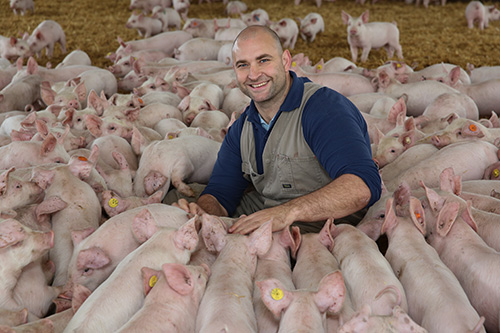Improving the viability of pigs

Dr Will van Wettere
Roseworthy campus has earned a reputation as the leading research centre for pig reproduction in Australia in a program which involves close collaboration with industry. Will van Wettere threw on a backpack and headed for New Zealand to milk cows and play rugby after graduating with honours in agricultural science from the University of Edinburgh. It was a working holiday which was meant to lead into a research career in the dairy industry. Fourteen years later and he's one of Australia's leading pig reproduction experts with an international reputation. "Someone persuaded me that pigs are small pink dairy cows," says Dr van Wettere. "Well, maybe not, but they do have a lot of similar issues when it comes to nutrition and reproduction." A lack of opportunities in dairy research proved a bonus for the pork sector as the young researcher pursued ways to maximise the reproductive potential of pigs. His travels brought him to Adelaide where he worked for South Australian Research and Development Institute (SARDI) and he completed a PhD at the University of Adelaide on the reproductive physiology of sows. Since 2009 Dr van Wettere has been a lecturer at the School of Animal and Veterinary Sciences at the University of Adelaide's Roseworthy campus where he's heading numerous research projects to improve pig fertility and the life expectancy of piglets. Roseworthy is now considered the leading research centre for pig reproduction in Australia. "Our research is aligned with the priorities of the Co-operative Research Centre for High Integrity Australian Pork and Australian Pork Limited, and we work closely with SARDI and commercial piggeries in South Australia and interstate," he says. Nutrition and dietary strategies have been a major focus of the research and have resulted in several landmark discoveries. They include the addition of betaine to the sows' diet to improve reproductive performance in summer when the animals struggle because of the heat. The supplement has been shown to increase the litter size by one to two piglets and is now used in most piggeries in Australia. Improving the survival rate of new-born piglets is another priority. Birth hypoxia - a lack of oxygen during the birth process - seems to be a risk factor for piglet survival. Again, diet is proving to be the key. "Traditionally the approach has been to treat the individual piglet, but we're looking at dietary strategies in the pregnant sow to reduce the problem in the piglet," says Dr van Wettere. "We're focusing on two types of dietary ingredients - compounds such as creatine monohydrate and melatonin to help the piglet cope with birth hypoxia, and caffeine to increase their vigour to support more rapid milk ingestion." Interestingly, the team is making use of research findings on humans to help inform its approach. Normally it's the other way around.
|




